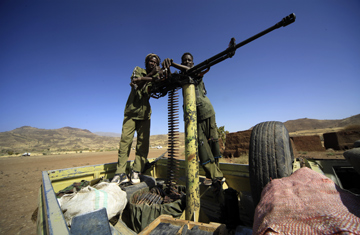
Members of government forces during a visit of Ibrahim Gambari, the civilian head of UNAMID, in east Jebel Marra (South Darfur), 9 km (6 miles) of West Deribat March 18, 2011.
Fears of a bloody birth for the world's newest country, South Sudan, are becoming ever more real after weeks of battles between its autonomous government and their opponents. Hundreds have died in fighting between South Sudan authorities and rebel militias. Now five rebel groups in four of the country's ten states appear to have united under one name, the Southern Sudan Democratic Movement, and one commander, George Athor. "There is a need for the world to know who we are," Athor told TIME via satellite phone from an undisclosed location. "Our manifesto will come out very soon."
Even without such a document, the aims and motivations of Athor and his men are clear. Athor is a former deputy chief of staff for the Sudan People's Liberation Army (SPLA), the armed wing of the Sudan People's Liberation Movement (SPLM), which led the fight for independence and now runs the government. Athor took his men to the bush last year after an unsuccessful bid in the election for a state governorship. In February, his forces killed more than 200 people, mostly civilians, in an attack on the village of Fangak in the northeast of South Sudan. Among his recruits are warlords who in the past have hired out their services to the northern Sudanese government to repress the southern population and clear villagers away from oil fields. Their alliance is likely as loose as all their previous fleeting allegiances, but the rebels clearly feel emboldened.
When they voted overwhelmingly in a January referendum to secede from Sudan's northern, Arab government in Khartoum, most southern Sudanese hoped they were turning a new page after decades of war. South Sudan's independence, scheduled for July, is the endgame of a 2005 U.S.-backed peace deal to stop a half century of north-south bloodshed in which more than 2 million people died. But the jubilee of January was short-lived. The referendum instead signaled a new round of intra-south killings, as old warlords awoke from hibernation and new dissidents gathered strength.
The rebels are not just driven by opportunism. If the new southern government wants peace, it will have to solve some fundamental divisions. First among them: the government's domination by the south's largest tribe, the Dinka. Bapiny Monituel, a beefy, boyish-faced general who joined Athor earlier this month, says that after the 2005 peace deal, he joined the northern army rather than the SPLA because he is Nuer. "Everything [in the south] is controlled by the Dinka. They don't want us to come to power."
Dinka leaders counter that Nuer hold deputy positions in both the SPLA and the southern government. Nevertheless, when the Dinka South Sudan President Salva Kiir named a constitutional review committee in February, 15 of the 24 members came from his tribe. Widespread official corruption and land grabbing only exacerbates the animosity. Noting the lack of development in the south since 2005, despite hundreds of millions of dollars in aid and billions more the government has received in oil revenues, Monituel grumbles: "The oil [money] is going to the Arabs in the north and the Dinka in the south, but it is in our land." Says Jon Temin, Sudan program director at the U.S. Institute of Peace: "With the referendum complete, the old grievances and armed groups have resurfaced."
The SPLA claims the rebels are proxies for the north. On March 12, SPLM secretary-general Pagan Amum suspended talks with the north on how to handle July's separation, accusing Khartoum of seeking to overthrow the southern government. But when he produced documents allegedly proving that the north is backing Athor, independent experts dismissed them as unsophisticated forgeries. For its part, the north does not deny that in the past it worked to undermine the southern leadership. But Al-Dirdiri Mohammed Ahmed, a member of the ruling National Congress Party's negotiation team, says that was no worse than the support offered by the south to Darfur's rebels in the west. "[We told SPLM:] 'We have to stop everything where it is, and let us now start a new page,'" he tells TIME.
Whatever the sincerity of that statement, the key issue does appear to be intra-south divisions rather than northern support for any dissident faction. Carol Berger, an anthropologist who studies the SPLA and militarization, says the number joining Athor and Co. is rising: "The violence spreading throughout many parts of the south is largely the result of unfinished business within the SPLA itself."
Only a few months ago, the splitting of Sudan looked set to be a rare diplomatic triumph in Africa. Now, as July 9, the day of secession, draws closer, it seems more likely that any celebrations will be muted. Sitting in his comfortable self-imposed exile in the northern capital Khartoum, rebel leader Monituel declares war: "Now that the referendum has gone we are dealing with our problems."
